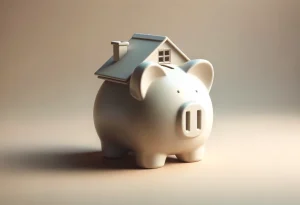In the tug-of-war between saving for a rainy day and investing in a home of your dreams, the rope seems heavier on both ends. It’s like choosing between a slice of cheesecake now or a whole cake later – both options are tempting.
In this single sentence journey, we promise to guide you through carving a clear path in the fog of financial decisions, helping you to pinpoint whether to save money or leap into buying a house.
Quick Takeaways:
- Assess financial health using tools like the 28/36 rule before deciding to buy, ensuring readiness for homeownership costs beyond the mortgage.
- Stay informed on market trends, as interest rates and housing prices fluctuate, impacting the best times to buy.
- Consider both the pros and cons of renting vs. buying, aligning the decision with personal and financial goals for the best outcome.
Is Now the Right Time to Buy a House?
Deciding whether to unlock the door to homeownership hinges significantly on the swings of the market and your personal financial standing. Presently, the economic climate is akin to a roller coaster ride, with interest rates and housing prices fluctuating more than a leaf in the wind. This volatility can make picking the perfect time to buy feel like looking for a four-leaf clover. Yet, understanding these tumultuous trends is crucial.
So, what’s the buzz in the market now? Currently, interest rates are inching upwards, making borrowing more expensive. Yet, in some regions, housing prices have started to stabilize or even dip slightly, potentially offering a silver lining for would-be buyers. But, the mantra here is caution. Economic conditions can shift faster than the weather in spring, so keeping an eye on reliable financial news sources like the Wall Street Journal or Bloomberg can help you stay informed.
If the stars align—stable job, hefty savings, manageable debt—it might be your moment. Otherwise, it might be wiser to wait it out, save more money, and watch how the market unfolds. Remember, timing in real estate isn’t just about market conditions; it’s also about your personal financial readiness.
Understanding Your Financial Health
Venturing into homeownership without a clear picture of your financial health is like setting sail without checking the weather—risky and potentially disastrous. Before you even consider browsing listings or dreaming about paint colors, take a deep dive into your finances. Here’s how to gauge if you’re ready:
-
Analyze Your Expenses : Track every penny you spend. From the morning latte to the streaming subscriptions, see where your money goes and identify areas to trim.
-
Debt-to-Income Ratio : Lenders love this metric. It’s your total monthly debt divided by your gross monthly income, expressed as a percentage. The lower the better. Aim for a ratio under 36%. Websites like Bankrate offer handy calculators to figure out where you stand.
-
Emergency Fund : Here’s an often overlooked nugget of wisdom—ensure you have an emergency fund that covers 3-6 months of living expenses before thinking about buying a house. This cushion can be a lifesaver during unexpected financial hiccups.
-
Unique Insight : Ever heard of the 28/36 rule? It’s a guideline suggesting that no more than 28% of your gross monthly income should go towards housing expenses, and not more than 36% towards total debt obligations, including your future mortgage. It’s a golden nugget that could help you avoid biting off more than you can chew.
The Real Costs of Homeownership
Many first-time buyers get spellbound by the allure of homeownership, overlooking the iceberg of expenses lurking beneath the surface. Think beyond the mortgage; here’s a breakdown of what to really expect:
-
Maintenance and Repairs : The rule of thumb suggests setting aside 1% of your home’s purchase price annually for maintenance. For a $300,000 home, that’s about $3,000 a year. Ouch!
-
Property Taxes and Insurance : These can vary widely based on location, home size, and other factors. A quick chat with a local insurance agent can give you a ballpark figure, but always estimate high.
-
HOA Fees and Utilities : If your dream home is in a community with a Homeowners Association (HOA), those fees need to be factored in. Plus, utilities in a larger space can be significantly higher than what you’re used to in a rental.
-
Renovations : Found the perfect location but the kitchen is stuck in the 1980s? Renovation costs can spiral quickly. It’s essential to budget generously and vet any contractors thoroughly.
Remember, homeownership is not just a living situation; it’s a long-term financial commitment. Weighing the true costs against your current and future financial stability can help you decide whether to save more money or dive into the market.
As we proceed, remember: buying a house is a monumental step. It’s more than an investment in property—it’s an investment in your future. Let’s tread carefully, shall we?
Saving Strategies That Work
When it comes to saving money, especially with the goal of buying a house, there’s no one-size-fits-all solution. However, adopting a mix of time-tested and innovative strategies can make your financial journey both manageable and effective. Let’s dive into ways to save smarter, not harder.
Create a Budget That Flexes With You
– Start with tracking your income and expenses to understand where your money goes each month. Use apps like Mint or YNAB (You Need A Budget) to make this easier. Then, set realistic savings goals and adjust your spending accordingly. But remember, your budget shouldn’t be a financial straitjacket. Allow for some flexibility to accommodate unexpected expenses without derailing your savings plan.
Automate Your Savings
– One of the most effective strategies is to “set it and forget it.” Arrange for a portion of your paycheck to be automatically deposited into a savings account each pay period. This not only fosters consistent saving but also reduces the temptation to spend what you intend to save.
Cut Back on Non-Essentials
– While it may sound cliché, cutting back on daily coffee runs, subscription services you rarely use, or dining out can add up to significant savings over time. Try a 30-day challenge where you cut a specific non-essential expenditure and track the savings. Small changes can lead to big results.
Prioritize Your Spending
– Not all expenses are created equal. Distinguish between what you want and what you need. Priorities might include rent, groceries, utilities, and savings for your house. Wants can be trimmed down or eliminated, particularly if you have a specific savings goal in mind.
Find Creative Ways to Increase Your Income
– Sometimes, saving alone isn’t enough. Look for opportunities to boost your income through side hustles, freelance work, or selling items you no longer need. Platforms such as Etsy, eBay, or Upwork can be great places to start.
Leverage High-Interest Savings Accounts
– Don’t let your savings languish in a low-interest account. High-yield savings accounts offer better interest rates, which means your money works harder for you.
One often overlooked strategy is to review your insurance policies annually. Many people stick with the same insurance providers for years without shopping around. This can lead to overpaying for coverage that might be available at a lower cost elsewhere. By comparing rates and switching insurers, you could potentially save hundreds of dollars a year – money that can bolster your house savings fund.
Rent vs. Buy: What Makes Sense for You?
Deciding whether to rent or buy is a major decision that hinges on several factors, including your financial situation, lifestyle preferences, and long-term plans. Here’s a breakdown to help you weigh your options:
Pros of Renting
- Flexibility: Renting allows you to relocate more easily, which is great for those who anticipate moving for work or personal reasons.
- Lower Upfront Costs: Generally, renting requires less money upfront than buying a home, with costs mainly limited to a security deposit and the first month’s rent.
- Minimal Maintenance: When you rent, most maintenance issues and repairs are the landlord’s responsibility, reducing your household expenses and hassle.
Cons of Renting
- No Equity: Your rent payments don’t go toward building equity; they are an expense with no financial return.
- Rental Increases: You may face annual rent increases, depending on market conditions and lease terms, which can make long-term budgeting difficult.
- Less Stability: Leases typically last for a year, offering less long-term stability compared to owning a home.
Pros of Buying
- Build Equity: Mortgage payments contribute to building equity in your home, an asset that can appreciate over time.
- Creative Freedom: Homeownership allows you to customize your space without restrictions typically imposed by landlords.
- Potential Tax Advantages: You may be eligible for tax deductions related to homeownership, such as mortgage interest and property taxes.
Cons of Buying
- Higher Upfront Costs: Down payments, closing costs, moving expenses, and home maintenance can add up quickly.
- Maintenance Responsibilities: As a homeowner, all repairs and maintenance will be your responsibility, both in terms of cost and effort.
- Less Flexibility: Selling a home or moving can be more complicated and time-consuming compared to ending a rental lease.
Ultimately, the decision between renting and buying should align with your current financial situation, lifestyle needs, and long-term goals. For example, if you value mobility or are uncertain about your long-term plans, renting might be the way to go. On the flip side, if you’re looking for stability, long-term investment, and the ability to personalize your living space, buying a house could be the right choice.
Before making a decision, consider speaking with a financial advisor or using online calculators to compare the costs of renting versus buying in your area. Remember, the best choice is the one that aligns with your personal and financial priorities.
As a financial advisor, my goal is to guide you through the world of personal finance with clear, practical advice. With a dedication to clarity and your financial well-being, I’m here to provide insightful guidance and support as you build a foundation of wealth and security.



